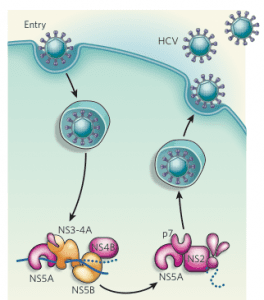

To identify new inhibitors of HCV, a chemical library of one million compounds was screened for the ability to inhibit viral replication in cell culture. The active compound were then subjected to a second screen to eliminate inhibitors of known viral enzymes: the viral protease, RNA polymerase, and helicase. One of the remaining inhibitors was further refined chemically until a very potent derivative was obtained. This molecule, called BMS-790052, has a 50% inhibitory concentration in the picomolar range, and inhibits all the viral genotypes tested. It is the most powerful inhibitor of HCV discovered.
The compound was tested for safety and bioavailability in various animal species. After oral administration, the compound was found in plasma and liver, despite a molecular mass of over 700 daltons. Six different levels of the compound were tested in HCV infected individuals. No adverse effects were reported, and the highest amount administered reduced viral levels in the blood 2,000 fold after one day. These results are promising, but larger trials will now be needed to further confirm the safety and efficacy of the drug.
What is the target of BMS-790052? Two lines of evidence suggest that the compound inhibits the viral protein NS5A. The drug appears to bind NS5A, and viruses resistant to the drug have amino acid changes in this protein. Although NS5A is known to be required for viral replication, its precise function is not known. Because NS5A does not have an easily assayable enzymatic function, it has not previously been a target of drug discovery. The identification of a compound that inhibits NS5A function is an important step forward in HCV drug development. The general approach used to discover BMS-790052 should be useful in identifying inhibitors of other viral proteins that do not have well defined and measurable activities.
I discussed this paper on Futures in Biotech episode #60. If you would like to listen only to the conversation about BMS-790052, download this mp3 file, or listen to the discussion below.
[audio:https://www.virology.ws/fib60.mp3 | titles=FIB 60]Gao M, Nettles RE, Belema M, Snyder LB, Nguyen VN, Fridell RA, Serrano-Wu MH, Langley DR, Sun JH, O’Boyle DR 2nd, Lemm JA, Wang C, Knipe JO, Chien C, Colonno RJ, Grasela DM, Meanwell NA, & Hamann LG (2010). Chemical genetics strategy identifies an HCV NS5A inhibitor with a potent clinical effect. Nature, 465 (7294), 96-100 PMID: 20410884

Pingback: Tweets that mention A new target for hepatitis C virus -- Topsy.com
This is the tough one. a hepa without cure.
“Well , the coach outlet view of coach handbags the passage is totally correct ,your details is really reasonable and you guy give us valuable informative post, I totally agree the standpoint of upstairs. I often surfing on this forum when I m free and I find there are so much good information we can learn in this forum!
ugg boots outlet
Great information, but you undercut your credibility with the “Sex and drug” comment. Sex is NOT the primary cause of infection. From the CDC I quote:
“Today, most people become infected with the Hepatitis C virus by sharing needles or other equipment to inject drugs. Before 1992, when widespread screening of the blood supply began in the United States, Hepatitis C was also commonly spread through blood transfusions and organ transplants.
Can Hepatitis C be spread through sexual contact?
Yes, but the risk of transmission from sexual contact is believed to be low. The risk increases for those who have multiple sex partners, have a sexually transmitted disease, engage in rough sex, or are infected with HIV. More research is needed to better understand how and when Hepatitis C can be spread through sexual contact.”
How to cure HCV carriers? Western pharmaceutical industry can't figure out real solution
for HCV carriers? HCV can mutate so easily. This is the reason why HCV has six genotypes
with over 50 subtypes. A few amino acids change of HCV can cause drug resistant.
Nano-medication will be the only solution for HCV carriers. Nano-medication is from
the Holy Bible. God formed man out of dirt from the ground. Hopefully, in the near future,
nano-medication can present God's mercy to all humans